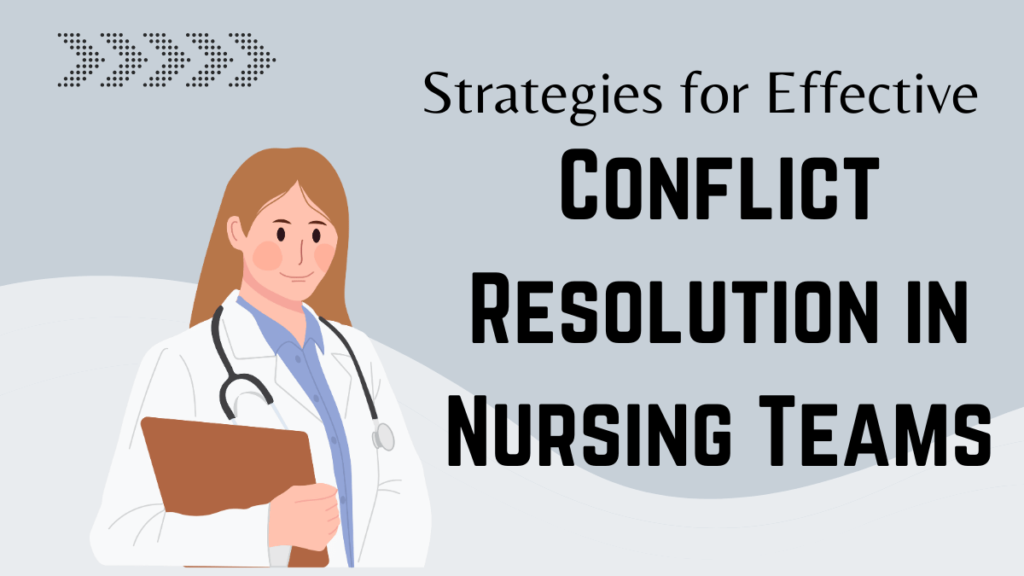In the dynamic environment of healthcare, conflict is inevitable, especially within nursing teams. Differing personalities, high-stress situations, and varying perspectives can all contribute to tensions that, if left unaddressed, may compromise patient care. However, with effective conflict resolution strategies, nursing teams can navigate disputes constructively, fostering a culture of collaboration and unity. In this comprehensive guide, we delve into proven techniques and best practices for resolving conflicts within nursing teams, ensuring optimal patient outcomes.
Understanding Conflict in Nursing Teams
Conflict in nursing teams can arise from various sources, including differences in communication styles, workload distribution, or disagreements on patient care approaches. Moreover, unresolved conflicts can escalate, leading to decreased morale, increased turnover rates, and ultimately, compromised patient safety.
Identifying Common Sources of Conflict:
- Communication Breakdowns: Misunderstandings due to ineffective communication channels or lack of clarity in conveying critical information.
- Role Ambiguity: Unclear delineation of roles and responsibilities within the team, leading to turf wars or feelings of being undervalued.
- Resource Allocation: Disputes over resource distribution, such as staffing levels or access to essential equipment.
- Personality Clashes: Differences in personality traits, work styles, or values that lead to friction during team interactions.
Impact of Unresolved Conflict:
- Decreased Morale: Persistent conflict can erode team morale, leading to decreased job satisfaction and increased burnout rates among nursing staff.
- Compromised Patient Care: Unresolved conflicts can divert attention from patient needs, resulting in errors or lapses in care delivery.
- Increased Turnover: Chronic conflict within nursing teams can contribute to staff turnover, further exacerbating staffing shortages and impacting continuity of care.
Strategies for Effective Conflict Resolution
Addressing conflicts within nursing teams requires a systematic approach that promotes open communication, mutual respect, and collaboration. Implementing the following strategies can help mitigate conflicts and foster a supportive work environment conducive to optimal patient care.
1. Establish Clear Communication Channels
Objective: Enhance transparency and clarity in team communication to prevent misunderstandings and promote a culture of open dialogue.
Actions:
- Regular Team Meetings: Schedule regular team meetings to discuss ongoing issues, share updates, and solicit feedback from team members.
- Utilize Digital Platforms: Implement digital communication tools, such as email updates or messaging apps, to facilitate real-time communication among team members.
- Clarify Expectations: Ensure clarity in conveying expectations regarding roles, responsibilities, and performance standards to prevent ambiguity.
2. Promote Active Listening
Objective: Cultivate a culture of active listening, where team members feel heard and valued, fostering empathy and understanding in resolving conflicts.
Actions:
- Encourage Empathetic Listening: Train team members in active listening techniques, emphasizing the importance of understanding perspectives before formulating responses.
- Practice Reflective Listening: Encourage paraphrasing and summarizing during conversations to ensure accurate understanding of others’ viewpoints.
- Validate Feelings: Acknowledge the emotions expressed by team members during conflicts, demonstrating empathy and fostering trust.
3. Foster Collaborative Problem-Solving
Objective: Encourage collaborative problem-solving approaches that leverage the collective expertise of the nursing team to address conflicts and identify sustainable solutions.
Actions:
- Brainstorming Sessions: Facilitate brainstorming sessions where team members can collectively generate ideas and solutions to address underlying issues.
- Utilize Root Cause Analysis: Apply root cause analysis techniques to identify the underlying factors contributing to conflicts and develop targeted interventions.
- Seek Mediation: Engage neutral mediators, such as nurse managers or trained facilitators, to facilitate constructive dialogue and resolution of conflicts.
4. Implement Conflict Resolution Policies
Objective: Establish clear protocols and procedures for addressing conflicts within the nursing team, providing a framework for timely intervention and resolution.
Actions:
- Develop Conflict Resolution Guidelines: Collaboratively develop conflict resolution guidelines outlining steps for addressing conflicts, escalation procedures, and resolution mechanisms.
- Provide Training: Offer training sessions on conflict resolution techniques and de-escalation strategies to equip nursing staff with the necessary skills to navigate conflicts effectively.
- Monitor and Evaluate: Regularly review conflict resolution processes and policies to identify areas for improvement and ensure adherence to established protocols.
5. Cultivate a Culture of Respect and Trust
Objective: Foster a culture of respect, trust, and mutual support within the nursing team, where differences are embraced and conflict is viewed as an opportunity for growth.
Actions:
- Lead by Example: Demonstrate respectful and inclusive behavior as a leader, modeling positive communication and conflict resolution strategies for the team.
- Recognize and Celebrate Diversity: Celebrate the diversity of perspectives, experiences, and backgrounds within the nursing team, emphasizing the value of different viewpoints in driving innovation and problem-solving.
- Encourage Feedback: Create opportunities for team members to provide feedback on team dynamics, communication processes, and conflict resolution strategies, fostering a culture of continuous improvement.
Conclusion
Effective conflict resolution is essential for fostering a cohesive and high-performing nursing team, ultimately enhancing patient care outcomes. By implementing proactive communication strategies, promoting active listening, fostering collaborative problem-solving approaches, implementing conflict resolution policies, and cultivating a culture of respect and trust, nursing teams can navigate conflicts constructively and promote a supportive work environment. By prioritizing effective conflict resolution, nursing teams can enhance job satisfaction, reduce turnover rates, and, most importantly, ensure the delivery of safe and quality patient care.

